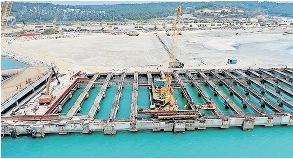
With the milestone of 3,000 days since the
inception of work, the saga unfolds with revelations of missed deadlines,
renegotiated terms, and contentious clauses favoring India’s business magnate
Gautam Adani. Gautam Adani’s initial
pledge, made amid much fanfare, to witness the first ship docking at Vizhinjam
within 1,000 days, fell by the wayside as deadlines were successively deferred.
Originally slated for September 1, 2018, the port’s inauguration was postponed
to December 3, 2019, marking the 1,459th day of construction. Now, as the
project grapples with its 3,000th day milestone, the finish line remains
distant, with crucial infrastructure elements far from completion.
The centerpiece of contention revolves
around Adani’s favorable deal structure, raising both eyebrows and tempers. Initially envisaged as an independent Engineering
Procurement and Construction (EPC) contract, the scope of ‘funded’ works,
including the construction of the breakwater and a new fishing harbor, was
revised upwards to INR 1,463 crore, with the entire cost burden shifted to the
Kerala government.
Moreover, Adani’s financial burden was
further alleviated as the Kerala government assumed responsibility for the
entire cost of external infrastructure,
such as road and rail connectivity, amounting to a staggering INR 1,973 crore.
The skewed financial arrangement paints a picture of disproportionate
risk-sharing, with Adani bearing only 33% of the total project cost, while
Kerala shoulders a hefty 67%. The
contours of the agreement reveal an asymmetrical distribution of benefits, with
Adani securing favorable clauses akin to a ‘farewell gift’ upon project
termination. The inclusion of a termination clause, unprecedented in
comparable infrastructure projects, entitles Adani to a substantial termination
payment, calculated at the realizable fee collected in the project’s final
month multiplied by 30, amounting to approximately INR 19,555 crore at the end
of the 40-year concession period.
Amidst mounting scrutiny, questions linger over the prudence of Kerala’s financial commitments, particularly in light of projected earnings from the port. Ernst & Young’s feasibility study forecasts Kerala’s earnings at INR 13,947 crore over 40 years, a fraction of the termination payment owed to Adani. The looming financial burden underscores the potential pitfalls of asymmetrically structured public-private partnerships, placing Kerala’s fiscal prudence in the spotlight.
With
the project’s fate hanging in the balance, stakeholders
are left grappling with the consequences of delayed timelines, renegotiated
terms, and the specter of financial overreach in the pursuit of maritime
ambitions.